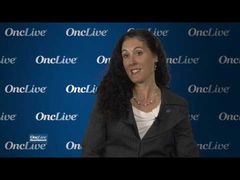
Dr Zarrabi on Questions Regarding the Use of Triplet Therapy in Prostate Cancer
Kevin Kayvan Zarrabi, MD, MS, FACP, discusses remaining questions regarding treatment consisting of triplet therapy in patients with metastatic castration-sensitive prostate cancer.
Episodes in this series

Kevin Kayvan Zarrabi, MD, MS, FACP, assistant professor, Sidney Kimmel Cancer Center at Jefferson Health, discusses remaining questions regarding treatment consisting of triplet therapy in patients with metastatic castration-sensitive prostate cancer (mCSPC).
The data derived from the phase 3 PEACE1 (NCT01957436) and ARASENS (NCT02799602) trials exhibit compelling evidence supporting the advantages associated with treatment intensification utilizing triplet therapy in patients with mCSPC, Zarrabi begins. The observed overall survival benefits are notably robust in these trials, and there are distinct divergences of survival curves and outcomes, Zarrabi explains. However, certain questions remain unanswered. A small subset of patients with mCSPC have metachronous metastases, defined as progression from localized disease to distant metastasis over the course of their treatment. Thetumor biology of metachronous disease may differ from the biologies of the tumors observed in the overall patient cohorts of PEACE1 and ARASENS, he emphasizes.
Moreover, although a discernible trend favors triplet intensification in patients with low-volume disease, this evidence is not representative of the overall mCSPC patient population, with some survival data displaying wide confidence intervals, Zarrabi adds. As data with triplet therapies mature, greater clarity may emerge regarding the extent of the benefit achieved with these combinations and whether they are applicable to a specific patient subset or the broader population, he expands.
Additionally, there remains an absence of a comprehensive understanding of the criteria defining chemotherapy fitness, Zarrabi notes. Determining which patients will benefit from docetaxel and which are at risk of experiencing associated morbidity and potential early mortality is a pertinent question, he emphasizes. Currently, clinicians can assess patient fitness based on performance status and their capacity to tolerate chemotherapy-induced toxicities. However, there is a lack of standardized criteria for evaluating chemotherapy eligibility, Zarrabi says. Consequently, outcomes in patients on the borderline of chemotherapy eligibility remain unexplored. As time progresses and further research endeavors are conducted, answers to these uncertainties may become clearer, Zarrabi imparts.
Lastly, both the ARESENS and PEACE1 trials aimed to further explore the utility and benefits of supplementing androgen receptor (AR)–directed therapy alongside androgen deprivation therapy (ADT) and docetaxel, Zarrabi continues. However, a trial investigating the specific benefits of docetaxel within a triplet combination therapy, where the control arm incorporates ADT and AR-directed therapy and the experimental arm introduces cytotoxic chemotherapy, has yet to be conducted, Zarrabi says. In the future, studies may adopt this design, which will contribute significantly to elucidating the efficacy of triplet therapy and identifying the ideal patient population for this approach, Zarrabi concludes.










































